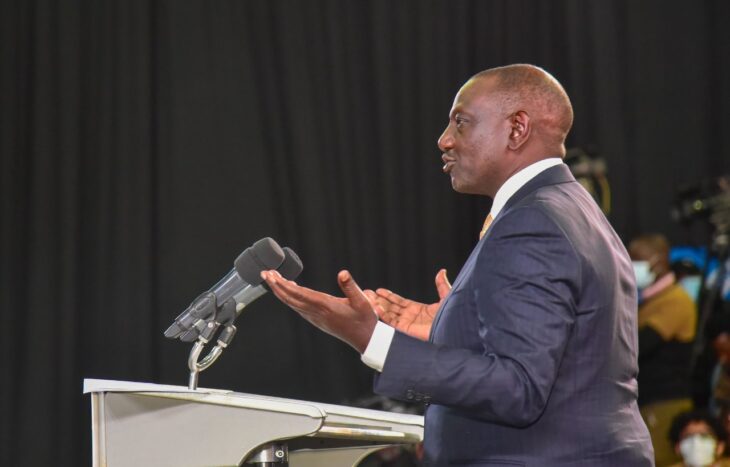NAIROBI, Kenya, Jul 1- Thirty-nine days to Kenya’s general elections, Kenya Kwanza presidential candidate William Ruto released a detailed manifesto at a ceremony held on Thursday evening, promising to tackle critical areas of the economy currently on the death bed.
His manifesto focuses on 7 areas that include Agriculture, Housing, Digital superhighway, environment, and climate change, manufacturing, and Micro, Small, and Medium Enterprises.
The manifesto anchored on his bottom-up economic model was prepared after a series of economic meetings at all the 47 Counties including reviews by over 250 technocrats drawn from all sectors of the economy, the Deputy President said.
More than 90,000 people, Ruto said, participated in the economic forums.
On the areas of focus, he said the Kenya Kwanza team settled on the seven areas due to their ability to bring the cost of living down, eradicate hunger, create employment and expand the country’s tax base and enhance inclusive growth.
“To say we’re in a storm is an understatement…there are no enough white-collar jobs to absorb Kenyans with the aspiration of joining the middle-class income earners,” Ruto, who’s one of the leading Presidential candidates in this year’s election said.
In Kenya, he said there are 10 million Kenyans who are either unemployed or under-employed.
“Sooner or later, the dam will break,” he cautioned but went ahead to explain how if elected he will address the unemployment crisis.
He said “crumbles” like the jubilee government-led Kazi Mtaani programmes or the current import of nurses to the United Kingdom was not a sustainable way of addressing the unemployment problem.
He also touched on the ballooning cost of living and ways to maneuver out of it.
In 2018, he noted that two kilograms cooking floor retailed at Sh75 and as of Thursday, the same was selling at a whooping Sh230.
He also spoke of Kenya’s national debt which stands at Sh9 trillion.
“We will be spending one trillion shillings on debt servicing alone this year,” he said.
“If you find yourself in a hole, you should stop digging as a matter of principle.”
-Ruto’s Economic Plan –
Anchored on the 7 thematic areas, if elected Kenya’s fifth President, Ruto who is running on a United Democratic Alliance party ticket under the Kenya Kwanza Alliance said he will change Kenya’s economic model.
From the current trickle-down economic model, he said he will implement the bottom-up economic model.
“The policy choices we need to make is not necessarily about the cash we have but where we want to invest it,” he said.
He gave the Sh4 billion guns assembly firm in Ruiru as an example of a trickle-down economic model saying it only created a hundred jobs.
With way less money, he said Kitui County Government created garments manufacturing factory and created 600 jobs.
In realizing his bottom-up economic model, he said the Kenya Kwanza government will target the 19 million Kenyan workforce.
Of those, he said 3 million are in corporate and formal employment.
The remaining 16 million people are in micro, small and medium enterprises.
“An inclusive employment creating economic model is about investing the little capital available where it creates the most impact, and that’s at the bottom of the pyramid,” he said.
-Why Invest In Agriculture?-
He said with agriculture consisting of 50 percent of Kenya’s economy, he said if more investments are channeled to the sector, the government can easily eradicate hunger, create more jobs, expand the tax base and ensure there’s inclusive growth.
“Agriculture is the most competitive sector of our economy,” he said.
He said Agriculture has the highest multiplier effect on job creation.
“Investing in agriculture is investing in jobs,” he said.
On the current food crisis in the country, he said this was occasioned by the move by the jubilee government to withdraw the fertilizer subsidy fund, which was part of the Big Four Agenda.
Currently, Kenya is spending more than Sh300 billion to import food every year.
Of the amount, he said Sh90 billion was spent to import edible oil and Sh25 billion on rice.
“We can save on our hard-earned foreign exchange if we change our model,” he said.
Investing in agriculture, he added would save Kenyans their income.
According to Ruto, Kenyans spend 54 percent of their income on food. For poor households, he said it is up to 60 percent of their income.
Want to send us a story? Contact Shahidi News Tel: +254115512797 (Mobile & WhatsApp)


